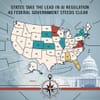The US is witnessing a surge in state-led AI regulation, with over a dozen states passing or proposing their own AI laws. This development is driven by the federal government's slow pace in implementing comprehensive AI regulations. States like California, New York, and Texas are taking proactive steps to address AI-related issues.
California has proposed disclosure rules for automated decision-making systems and restrictions on facial recognition by law enforcement. The state has also introduced bills to ensure AI systems are transparent and fair. New York has introduced legislation to regulate AI bias and discrimination, requiring bias audits for AI hiring tools and imposing penalties for discriminatory outcomes. Texas has passed business-friendly AI legislation, emphasizing responsible innovation while addressing concerns about bias and transparency.
The state-led approach to AI regulation is focused on ensuring transparency and accountability, preventing AI-driven bias and discrimination, and protecting consumers from AI-generated content. However, this approach may create a complex regulatory environment, with companies facing different laws and regulations in each state.
There is an ongoing debate about whether the federal government should preempt state AI laws, with some arguing it would provide clarity and consistency, while others believe it would stifle innovation and consumer protection. Companies operating across multiple states may need to navigate different regulatory frameworks, potentially limiting product rollouts or shifting focus away from AI altogether.
The future of AI regulation in the US remains uncertain, with the outcome depending on the balance between state-led initiatives and potential federal oversight.


